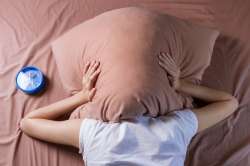Eight-hour sleep may boost academic performance: Study
Those who opted to take the challenge wore sleep-monitoring wristbands for five days to ensure accurate study results.

If you are also among those students who prefer to take eight hours of sleep during the exam then it is a positive sign for health. According to a study, students who sleep for eight hours are more likely to perform better. "Better sleep helped in final exam performance, which is contrary to most college students' perceptions that they have to sacrifice either studying or sleeping," said Michael Scullin, Assistant Professor at Baylor University's College of Arts & Sciences.
For improvement in academic performance, a student does not have to be an 'A' grade, the researchers said.
The findings showed that whether a student was an A, B, C, or D student before their final exam, sleeping eight hours was associated with a four-point grade boost.
"It is worth noting that one student who had a D-plus grade before the final but slept more than eight hours for a week during finals week remarked that it was the 'first time my brain worked while taking an exam'," Scullin said.
Poor sleep is common during finals as students cut back on sleep, deal with more stress, use more caffeine and are exposed to more bright light, all of which may disrupt sleep.
Fewer than 10 per cent of undergraduates maintain the recommended average of 8 hours a night or even the recommended minimum of 7 hours, the researchers said.
The study results were published in the Journal of Interior Design; and Teaching of Psychology journal.
In the study, the students were given extra points if they met "the 8-hour Challenge" -- averaging eight hours of sleep for five nights during final exams week.
The participants included undergraduate interior design students and students in upper-level psychology and neuroscience classes.
Those who opted to take the challenge wore sleep-monitoring wristbands for five days to ensure accurate study results.
"Students who showed more consistent sleep performed better than those who had less consistent sleep. And students who achieved the challenge performed as well or better than those who did not take the challenge," the researchers noted.
(With IANS Inputs)